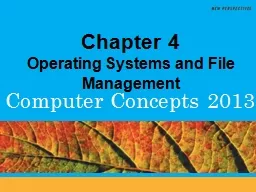PPT-Chapter 6 Time Management
Author : lindsaybiker | Published Date : 2020-06-19
RoutledgeTaylor amp Francis 2016 Agenda Learning Objectives Time Management vs Procrastination Time Management Coveys 4 Quadrants Time Management Strategies Procrastination
Presentation Embed Code
Download Presentation
Download Presentation The PPT/PDF document "Chapter 6 Time Management" is the property of its rightful owner. Permission is granted to download and print the materials on this website for personal, non-commercial use only, and to display it on your personal computer provided you do not modify the materials and that you retain all copyright notices contained in the materials. By downloading content from our website, you accept the terms of this agreement.
Chapter 6 Time Management: Transcript
Download Rules Of Document
"Chapter 6 Time Management"The content belongs to its owner. You may download and print it for personal use, without modification, and keep all copyright notices. By downloading, you agree to these terms.
Related Documents














